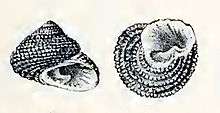Clanculus berthelotii
| Clanculus berthelotii | |
|---|---|
 | |
| Drawing showign two views of a shell of Clanculus berthelotii | |
| Scientific classification | |
| Kingdom: | Animalia |
| Phylum: | Mollusca |
| Class: | Gastropoda |
| Clade: | Vetigastropoda |
| Superfamily: | Trochoidea (superfamily) |
| Family: | Trochidae |
| Genus: | Clanculus |
| Species: | C. berthelotii |
| Binomial name | |
| Clanculus berthelotii (d'Orbigny, 1840) | |
| Synonyms | |
| |
Clanculus berthelotii is a species of sea snail, a marine gastropod mollusk in the family Trochidae, the top snails.[1]
Description
The size of the shell varies between 5 mm and 11 mm. The small shell has a globose-conic shape and is very similar in form to Clanculus corallinus. The five whorls are acutely granose-lirate. They are brown, below the sutures more or less maculated with blackish. The base of the shell is dotted with white. The body whorl is encircled by 11 sharply granose ridges, those of the base profoundly separated by deep grooves, wider than the ridges. The aperture is as in Clanculus corallinus, but the tooth at base of columella is more pointed and smaller.[2]
Distribution
This species occurs in the North Atlantic Ocean (the Azores, Madeira and the Canary Islands)
References
- ↑ Clanculus berthelotii (d'Orbigny, 1840). Retrieved through: World Register of Marine Species on 1 May 2010.
- ↑ H. Pilsbry, Manual of Conchology XI, Academy of Natural Sciences, Philadelphia
- d'Orbigny A. D., 1839-1842: Mollusques, Echinodermes, Foraminifères et Polypiers recueillis aux Iles Canaries par MM. Webb et Berthelot et décrits par Alcide d'Orbigny. Mollusques; Béthune, Paris
- Thorson G., 1967: Clanculus bertheloti d’Orbigny, 1839: eine brutpflegende prosobranchiate Schnecke aus der Brandungszone von Teneriffa. Zeitschrift für Morphologie und Ökologie der Tiere 60(1-3): 162-175
- Gofas, S.; Le Renard, J.; Bouchet, P. (2001). Mollusca, in: Costello, M.J. et al. (Ed.) (2001). European register of marine species: a check-list of the marine species in Europe and a bibliography of guides to their identification. Collection Patrimoines Naturels, 50: pp. 180–213